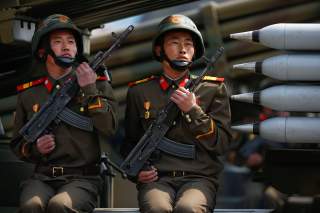Nuclear Power Play: How North Korea Uses U.S. Fears to Gain Leverage
North Korea is about to acquire the technological capability to produce nuclear-tipped missiles capable of hitting the continental United States. So what?
In refining the concept of the stability-instability paradox in the contemporary context, scholars have derived much from the South Asian experience. In this case, the dominant view is that Pakistan has been actively engaging in proxy war against India, like supporting insurgency and terrorism, while deterring the conventionally superior India from conventional retaliation with its nuclear umbrella. This logic has been so widely accepted that scholars have projected it on other nuclear rivalries, including the U.S.-North Korea relationship.
But the effect of the paradox in South Asia is exaggerated. As is well-known to South Asian experts, Pakistan’s proxy war is not a product of nuclearization. Instead, it is merely a continuation from the pre-nuclear period. Scholars who recognize this regard the intensification of Pakistan’s proxy war as the manifestation of the paradox, which results from Pakistani nuclear deterrent having raised the threshold for India’s retaliation. However, even though we suppose that Pakistan’s nuclear umbrella has facilitated its aggressive behavior, India has successfully restrained the actual intensification of violence to a considerable extent. The level of violence in Jammu and Kashmir, where Pakistan has traditionally centered its effort of anti-India proxy warfare, surged right after Pakistan’s de facto nuclearization in the late 1980s and nuclear tests in 1998. But since the “twin-peaks” crisis ended in 2002, that violence dramatically decreased and in 2012 reached almost the same level as before the first surge. Though the State has seen a turbulence since 2016, the present situation is never similar to the one at the beginning of 2000s, much less the mid-1990s. As for spectacular terror attacks outside Kashmir, which have also been treated as the intensification of violence, the parliamentary raid in 2001 and the terror attacks in Mumbai in 2006 and 2008 were indeed deadly. However, after the 2008 attack, we haven’t seen any comparable attack to them.
In view of this, we shouldn’t interpret the India-Pakistan case as exemplifying the potential danger of Pyongyang’s nuclearization. Rather, the lesson we should learn from it is that the paradox is manageable through appropriate countermeasures. In response to Pakistan’s lower-level violence, India has prepared and exercised lower-level retaliatory options: diplomatic efforts to isolate Pakistan, multifaceted counterinsurgency and counter-terror measures, intensifying retaliatory cross-border shelling, and signaling its willingness to pursue limited conventional operations. Through these options, India has, at least, contained the ramification of the stability-instability paradox.
What should we do?
As shown above, by ditching the two harmful narratives, we can relieve ourselves from the self-imposed disadvantageous position and deal with the Pyongyang’s nuclear issue more easily and not in a time-pressured manner.
What the United States and allies have to do can be summarized as follows. First, they should maintain and improve the comprehensive damage-limitation capability, including missile-defense systems operated by allies, and convey to North Korea that the United States does not believe that the North’s limited capability can function as an effective deterrent. If Pyongyang should resort to an actual nuclear use, then the United States needs to convey that it will be ready to defeat the threat with minimal damages incurred. Second, the United States and allies have to prepare and exercise an array of lower-level retaliatory options in response to the North’s adventurism.
Masahiro Kurita is a research fellow at the National Institute for Defense Studies (NIDS), Japan. The views expressed are those of the author and do not reflect the official policy or position of the NIDS, the Ministry of Defense or the Government of Japan.
Recommended:
Why North Korea's Air Force is Total Junk

